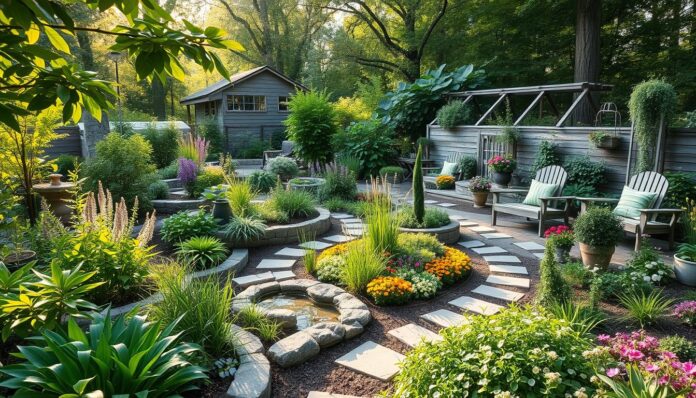I found a peaceful haven in the midst of chaos – a garden that healed and gave purpose. My journey into permaculture was more than growing plants. It was about finding inner peace through nature.
Today’s world is filled with stress, making us seek natural ways to feel better. Permaculture offers a special solution. It designs gardens that help both plants and our minds. By using nature’s wisdom, we can make spaces that calm our anxiety and balance our emotions.
This guide will show how permaculture can help create gardens for anxiety relief. We’ll learn how to link our well-being with nature’s design. This will help us make outdoor spaces that heal our minds.
Key Takeaways
- Permaculture provides a holistic approach to anxiety management
- Gardens can be designed as healing environments
- Natural stress management techniques can transform mental health
- Ecological design principles support emotional well-being
- Creating purposeful outdoor spaces reduces anxiety symptoms
Introduction to Permaculture and Anxiety Relief
Permaculture is a new way to improve mental health. It combines eco-friendly practices with creative garden designs. This approach creates sustainable spaces that help both our minds and nature.
Mindfulness gardening is a powerful tool for healing. It lets people connect with nature. This connection helps reduce stress and grow personally.
Understanding Permaculture Principles
Permaculture teaches us to work with nature. It has key ideas:
- Observing and interacting with natural environments
- Capturing and storing energy efficiently
- Obtaining sustainable yields
- Applying self-regulation and accepting feedback
The Connection Between Nature and Mental Health
“Nature itself is the best physician” – Hippocrates
Studies show nature is good for our minds. Being in nature can lower anxiety and boost mental health.
| Nature Interaction | Mental Health Benefits |
|---|---|
| Soil Engagement | Potential Antidepressant Effects |
| Garden Cultivation | Stress Reduction |
| Mindful Plant Observation | Improved Emotional Regulation |
Mindfulness gardening combines practices for better mental health. It creates healing spaces for people and nature.
The Role of Gardening in Stress Reduction
Gardening is a powerful tool for wellness, offering a holistic way to reduce stress. It nurtures both mind and body. The simple act of connecting with nature provides a transformative experience.
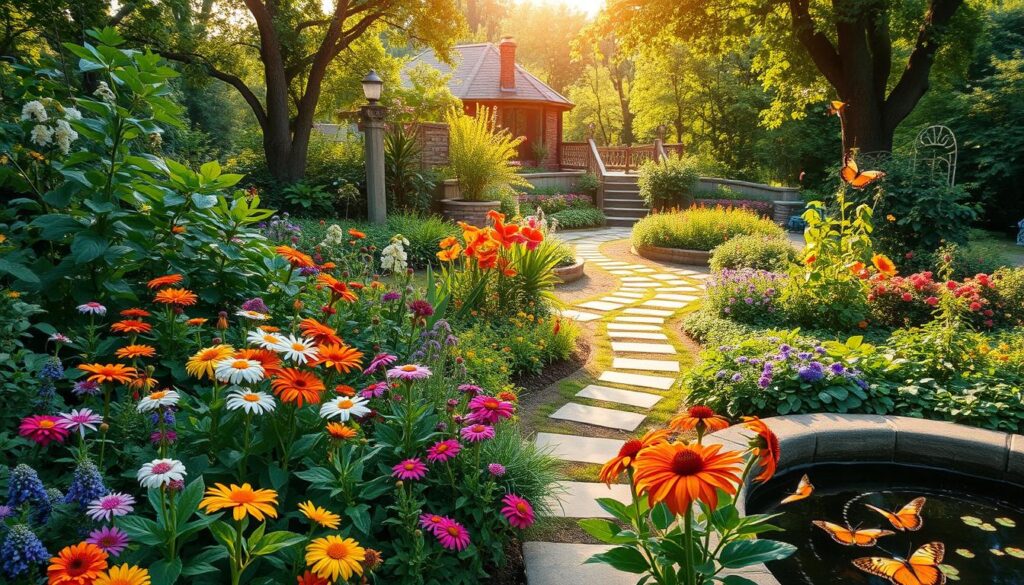
Research shows gardening has remarkable psychological benefits. It supports mental well-being. The Texas A&M AgriLife study highlights several key advantages:
- Reduced anxiety and stress levels
- Decreased symptoms of depression
- Enhanced memory retention
- Improved overall happiness
- Boosted self-esteem
Psychological Benefits of Gardening
Gardening is a natural way to reduce stress. Touching soil releases serotonin, acting as a natural antidepressant. The simple act of touching earth can create a profound emotional reset. Gardeners focus on nurturing plants, disconnecting from technology.
Physical Activity and Its Effects on Anxiety
Gardening provides moderate exercise, fighting anxiety through physical activity. Activities like weeding, digging, and raking work the whole body. They may reduce depression and prevent cognitive decline.
The World Health Organization says 3.6% of the global population has anxiety disorders. Finding alternative stress management methods is key.
Creating a Sense of Purpose and Accomplishment
Harvesting produce releases dopamine, creating a sense of achievement. Community gardening also boosts social connections, supporting mental health through shared experiences.
“Gardening is cheaper than therapy, and you get tomatoes” – Unknown
By adding gardening to daily life, people can grow sustainable wellness practices. These practices promote mental resilience and emotional balance.
Designing Your Anxiety Relief Garden
Creating an anxiety relief garden needs careful planning and understanding of organic healing. Permaculture design offers a holistic way to make a therapeutic outdoor space. It helps both your mind and body feel better. By using green living therapy, you can turn your garden into a calm and restorative place.
Assessing Your Space
Start by looking at your available area. Think about these important things:
- Sunlight exposure throughout the day
- Soil quality and drainage
- Existing landscape features
- Microclimate conditions
A smart design approach makes your garden more therapeutic.
Choosing the Right Plants
Pick plants that help you relax and engage your senses:
| Plant Type | Therapeutic Benefits | Sensory Experience |
|---|---|---|
| Lavender | Stress reduction | Calming scent |
| Chamomile | Anxiety relief | Soft texture |
| Rosemary | Mental clarity | Aromatic herbs |
Incorporating Water Features
Water elements greatly improve your garden’s therapy. Think about small fountains, birdbaths, or gentle streams. They make soothing sounds and help you focus through organic healing.
Adding Relaxation Zones
“A garden is a form of autobiography, and gardens speak volumes about their creators.” – Sydney Eddison
Make areas for meditation, reflection, and green living therapy. Add comfy seating, natural shade, and things that encourage calm thinking.
By carefully following these design tips, you’ll make a garden that supports your mental health. It will also become a personal healing and peaceful place.
Key Elements of Permaculture
Permaculture is more than just gardening. It’s a way to live in harmony with nature. By learning its core principles, we can find peace and reduce anxiety.
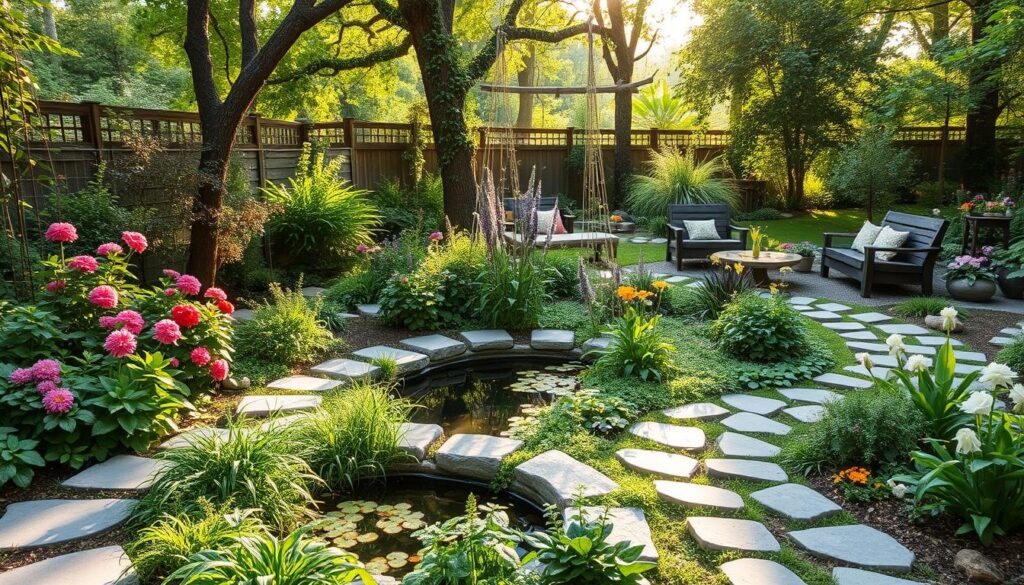
Permaculture isn’t just about plants. It’s about building a balanced ecosystem. This balance helps our mental and environmental health.
Diversity in Plant Selection
Choosing many plant types makes gardens strong. Permaculture teaches us to use plants for many things:
- Medicinal herbs for healing
- Edible landscapes for food
- Native species for wildlife
Natural Resource Utilization
Managing resources well is key in permaculture. Using water and soil wisely helps gardens thrive on their own.
| Resource | Permaculture Strategy | Benefit |
|---|---|---|
| Water | Rainwater Harvesting | Reduces Water Consumption |
| Soil | Composting | Improves Soil Health |
| Energy | Passive Solar Design | Minimizes External Input |
Symbiotic Relationships
Building connected garden systems is like our need for friendship. When plants, insects, and people live together, we feel less anxious.
“In nature, nothing exists alone.” – Rachel Carson
Waste Minimization
Turning waste into something useful teaches us about living green. It’s good for the planet and helps us relax.
Therapeutic Plants for Anxiety Relief
Natural stress management starts with plants. Gardens can be places of healing, using plants to help with emotional health. This is a natural way to feel better.
Looking into therapeutic plants is a natural way to handle anxiety. Each plant has its own benefits for emotional health. They help create a peaceful space.
Herbs with Calming Properties
- Passion Flower: Traditionally used by Cherokee cultures for its medicinal properties
- Known to improve sleep quality and support emotional wellness
- Can be prepared as a tea or infused oil
“Nature itself is the best physician” – Hippocrates
Flowers that Promote Relaxation
- Rose: Uplifts emotions and supports nervous system
- Linden: Calming heart tonic rich in antioxidants
- Hawthorn: Supports cardiovascular health during stress
Edible Plants for Mindful Eating
Adding edible plants to your garden helps with anxiety. Plants like Tulsi and Motherwort are good to eat and help with stress. They make eating a mindful experience.
| Plant | Emotional Benefits | Preparation Method |
|---|---|---|
| Tulsi | Enhances energy and vitality | Tea or fresh leaves |
| Mimosa | Supports mental wellness | Herbal infusion |
More people are turning to natural healing, with 62% looking at herbal remedies. Creating a therapeutic garden is a way to make a peaceful space for yourself. It’s a natural way to manage stress and heal emotionally.
The Importance of Soil Health
Soil is more than just dirt. It’s a living ecosystem vital for eco-friendly mental health and sustainable wellness. Understanding soil health can turn your garden into a powerful space for healing.
Research shows a strong link between soil and mental well-being. A study found that soil bacteria can make our brains release serotonin. This helps control mood and boosts our immune system.
Techniques for Amending Soil
To improve soil quality, we need to take specific steps. These steps help both plants and our mental health:
- Test soil pH levels regularly
- Add organic matter like compost
- Use natural mineral supplements
- Implement crop rotation strategies
Benefits of Composting
Composting is a key sustainable practice. It helps gardens and our mental health. It cuts down greenhouse gases and makes soil rich in nutrients.
| Composting Benefit | Mental Health Impact |
|---|---|
| Reduces Food Waste | Creates Sense of Purpose |
| Improves Soil Quality | Provides Stress Relief |
| Supports Ecosystem | Enhances Environmental Connection |
Natural Fertilizers to Consider
Choosing natural fertilizers is good for our mental health. Options like bone meal, fish emulsion, and seaweed extract are rich in nutrients. They keep our environment safe.
“Healthy soil is the foundation of a healing garden, nurturing both plants and the gardener’s mental well-being.”
By following these soil health tips, we can make our gardens therapeutic. They support our mental wellness by connecting us with nature.
Incorporating Wildlife into Your Garden
Turning your garden into a vibrant ecosystem makes it a powerful sanctuary for stress relief. Wildlife is key to creating a balanced, healing outdoor space. This supports both green living therapy and mental wellness.
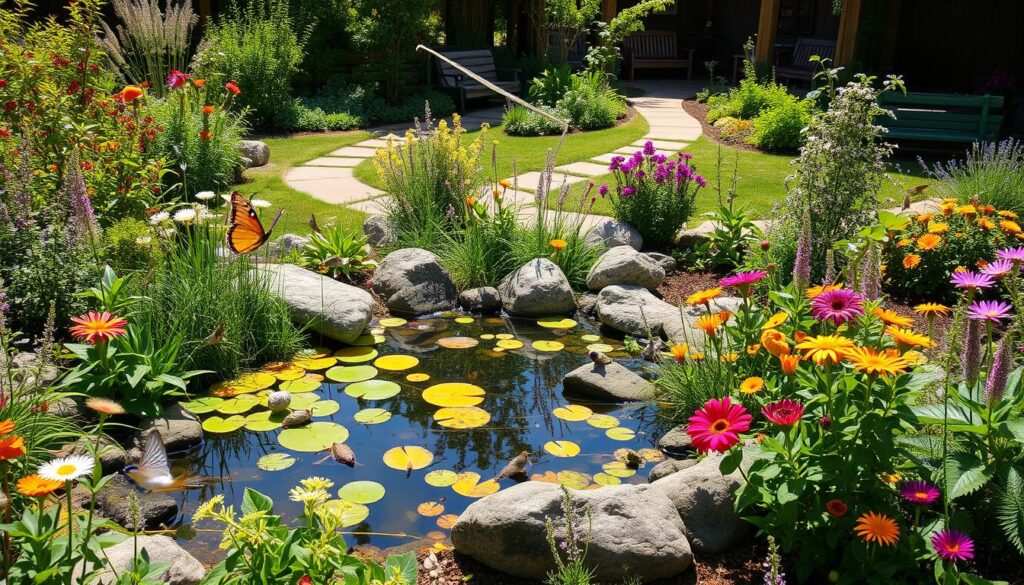
Gardens are more than just pretty places. They are living networks that support life. By designing spaces that attract wildlife, you create a healing landscape. This promotes harmony with nature.
Attracting Beneficial Insects
Beneficial insects are vital for garden health and stress relief. Here are ways to make your garden insect-friendly:
- Plant native flowering species
- Create diverse habitats with varying plant heights
- Avoid chemical pesticides
- Provide water sources like shallow dishes
Creating Bird Habitats
Bird habitats boost garden diversity and offer peaceful moments. Key elements include:
- Native berry-producing shrubs
- Bird feeders and birdbaths
- Dense shrubs for nesting
- Varied perching areas
Why Wildlife Matters for Garden Health
| Wildlife Type | Garden Benefit |
|---|---|
| Pollinators | Enhance plant reproduction |
| Predatory Insects | Natural pest control |
| Birds | Seed dispersal and pest management |
“In every garden, wildlife tells a story of interconnectedness and resilience.” – Environmental Design Expert
Adding wildlife to your garden supports ecological balance and offers a deep green living therapy experience. Each creature adds to a complex, healing ecosystem. This ecosystem nurtures both environmental and personal well-being.
Seasonal Care for Your Anxiety Relief Garden
Your mindfulness gardening journey changes with each season. It offers new chances for wellness. Gardens need careful care and attention all year.
Gardening connects us with nature’s rhythms. It helps our mental health. Studies show green spaces can cut stress by up to 40%.
Spring: Planting and Preparation
Spring is a time of renewal. Focus on:
- Soil preparation and amendment
- Selecting resilient, stress-reducing plants
- Creating nurturing garden spaces
Summer: Maintenance and Relaxation
Summer is for active garden work. Key tasks include:
- Regular watering and plant care
- Creating meditation spaces
- Practicing mindful gardening techniques
Autumn: Harvesting and Reflection
Autumn is for looking back and being thankful. It’s a time to:
- Collect seeds for next year
- Reflect on personal growth
- Prepare garden for winter transition
Winter: Planning and Restoration
Winter is for quiet planning. Use this time to:
- Design next year’s garden layout
- Study permaculture principles
- Research new sustainable gardening techniques
“Each season brings its own rhythm of healing and growth” – Permaculture Wisdom
By embracing seasonal changes, your garden becomes a place for growth and wellness.
Mindfulness and Gardening Practices
Permaculture turns gardens into healing places. Here, natural stress relief is a full experience. By adding mindful gardening, people make spaces that help both mind and body.
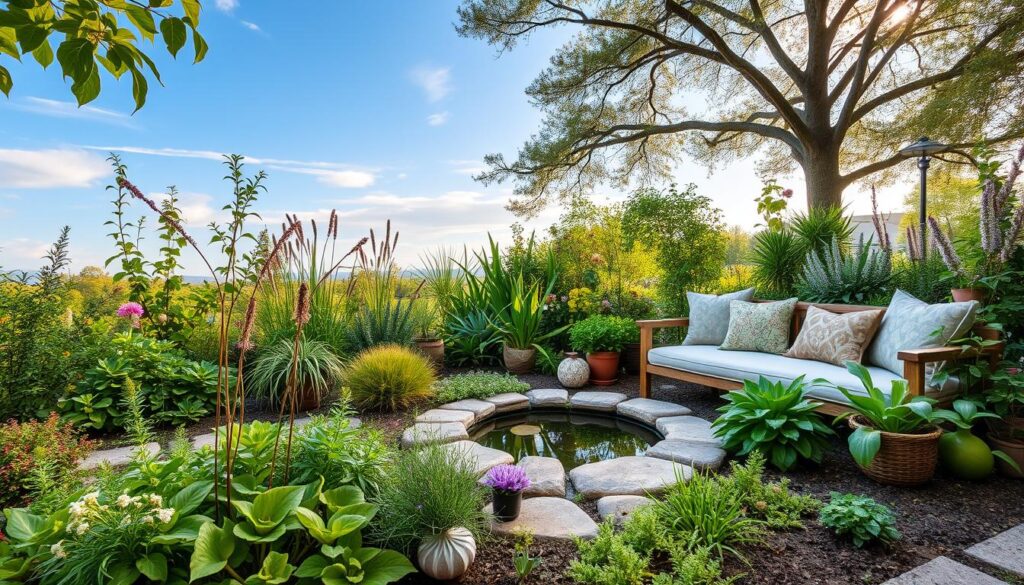
Techniques for Mindful Gardening
Mindful gardening uses all senses and focuses on the now. It shows big benefits:
- 94% of gardeners feel less stressed
- Studies show 20-30% less cortisol
- 75% see less anxiety
Creating Meditation Spaces in Gardens
Creating special spots for meditation in your garden boosts stress relief. Think about these things:
- Choose quiet, safe spots
- Put in comfy seats
- Use plants like lavender and chamomile
- Add soft water sounds
“Gardens are spaces where healing begins, one mindful moment at a time.”
Benefits of Mindfulness in Nature
| Mindfulness Practice | Mental Health Impact |
|---|---|
| Sensory Gardening | 50% mood improvement |
| Breathing Exercises | 25% stress reduction |
| Meditative Plant Care | 40% increased emotional resilience |
Mindful gardening through permaculture is a complete way to improve mental health. It connects us with nature’s healing power.
Building Community Through Permaculture
Permaculture gardens are more than just a place for personal growth. They are key to connecting communities and improving mental health. By turning individual gardens into shared learning spaces, people can build strong social networks focused on sustainability.
Engaging with Local Gardening Groups
Getting involved with local gardening groups boosts the mental health benefits of permaculture. These groups offer support, share knowledge, and provide a chance for social interaction. This helps fight off feelings of loneliness.
- Join neighborhood gardening clubs
- Attend community gardening workshops
- Participate in seed-sharing events
- Collaborate on group garden projects
Sharing Produce and Knowledge
Sharing knowledge and produce helps build relationships. Surplus produce can foster connections and teach sustainable living.
“Gardening is a way of showing care for both people and the planet” – Permaculture Expert
Hosting Workshops for Mental Health Awareness
Hosting workshops in gardens can turn them into powerful places for mental wellness talks. These events introduce eco-friendly mental health strategies through hands-on gardening experiences.
- Create informative presentations about gardening and stress reduction
- Invite local mental health professionals
- Demonstrate practical gardening techniques
- Provide resources for holistic stress reduction
Building community through permaculture helps create supportive networks. These networks promote both environmental sustainability and mental well-being.
Challenges in Creating a Permaculture Garden
Starting a permaculture garden for anxiety relief has its own set of challenges. It takes patience, creativity, and smart problem-solving. Gardeners on this path will face hurdles that help them grow and become stronger.
Natural Pest Management Strategies
Using organic methods is key to keeping pests away without chemicals. Good strategies include:
- Companion planting to keep pests away
- Introducing beneficial insects
- Using natural repellents like neem oil
- Creating diverse plant ecosystems
Adapting to Weather Variability
Unpredictable weather is a big challenge for permaculture gardens. Gardeners who succeed use strategies like:
- Designing for microclimates
- Using protective coverings
- Choosing native, adaptable plants
- Creating systems to save water
Overcoming Time and Resource Constraints
Even with limited time and resources, you can still create a healing garden. Here’s how:
- Start small with manageable sections
- Use low-maintenance perennial plants
- Make gradual, affordable improvements
- Join local gardening groups for support
“Challenges in gardening are opportunities for personal growth and healing.” – Permaculture Design Principle
By facing these challenges, gardening becomes a deep healing experience. Each obstacle is a chance to grow and connect with nature.
Resources for Further Learning
Learning about permaculture and anxiety relief is a journey. It involves constant learning and connecting with others. Green living therapy helps manage stress and builds a bond with nature. Understanding permaculture goes beyond reading; it’s about doing and learning more.
Exploring permaculture and mental health can seem daunting. But, many resources are available to help deepen your knowledge and practice of green living therapy.
Online Courses and Webinars
- Permaculture Design Certification (PDC) from Milkwood Permaculture
- Therapeutic Gardening Workshop by The Garden Therapy Project
- Stress Reduction Through Nature Courses on Udemy
- Mindful Gardening Webinars by Holistic Landscape Designers
Essential Books for Permaculture Anxiety Relief
- “The Healing Garden: Gardening for Mental Wellness” by Dr. Sarah Green
- “Permaculture and Personal Resilience” by Mark Shepard
- “Cultivating Inner Peace Through Garden Design” by Laura Jardine
Local Permaculture Organizations
Joining local permaculture groups can change your life. These groups offer support, workshops, and a community focused on green living and mental health.
“Learning is a continuous journey of growth and connection with both ourselves and the natural world around us.” – Permaculture Design Expert
About 50% of people feel stressed and tired. This makes finding ways to manage stress through nature even more important. By learning and joining communities, you can find effective ways to reduce stress naturally.
Personal Stories of Transformation
Permaculture gardens are becoming safe havens for those looking to manage stress naturally. People share how gardening has changed their mental health for the better.
Studies show gardens can heal. A study found 78% of people with anxiety found relief by gardening and being in nature. These stories show how nature can heal us.
Inspiring Case Studies
- Sarah Thompson, a marketing pro, found peace in permaculture gardening after burnout
- Michael Rodriguez turned his city backyard into a healing spot after work stress
- Elena Kim used gardening to cope with post-traumatic anxiety
Community Garden Impact
Community gardens are changing lives. A survey showed 62% of gardeners found gardening helps with stress and anxiety.
| Gardening Impact | Percentage |
|---|---|
| Stress Reduction | 62% |
| Mental Health Improvement | 55% |
| Anxiety Relief | 78% |
“Gardening isn’t just about growing plants; it’s about cultivating inner peace and resilience.” – Local Community Garden Coordinator
These stories show how permaculture gardens can change lives. By using natural stress management, people find emotional wellness and growth.
Conclusion: Embracing Nature for Anxiety Relief
Creating a permaculture garden is a great way to improve your mental health. Studies show that being in nature can reduce stress and boost well-being. Connecting with nature can help with anxiety and feeling tired.
Practices like permaculture gardening offer a new way to handle mental health. With 40 million adults in the U.S. dealing with anxiety, these gardens are a big help. They increase energy, improve mood, and connect us to nature.
Starting your healing journey is easy. You can make a difference, no matter the size of your space. By using permaculture, you create a place that heals your mind and helps the environment. This leads to a more balanced and strong approach to wellness.
The Lasting Benefits of a Permaculture Garden
Permaculture gardens offer more than just stress relief. They boost the immune system, lower inflammation, and connect us to nature. As the organic food market grows, so does the recognition of nature’s healing power.
Encouragement to Start Your Journey
Your journey to better mental health is special and yours alone. See permaculture gardening as a strong tool for fighting anxiety. Every seed you plant is a step towards healing and caring for the earth.

